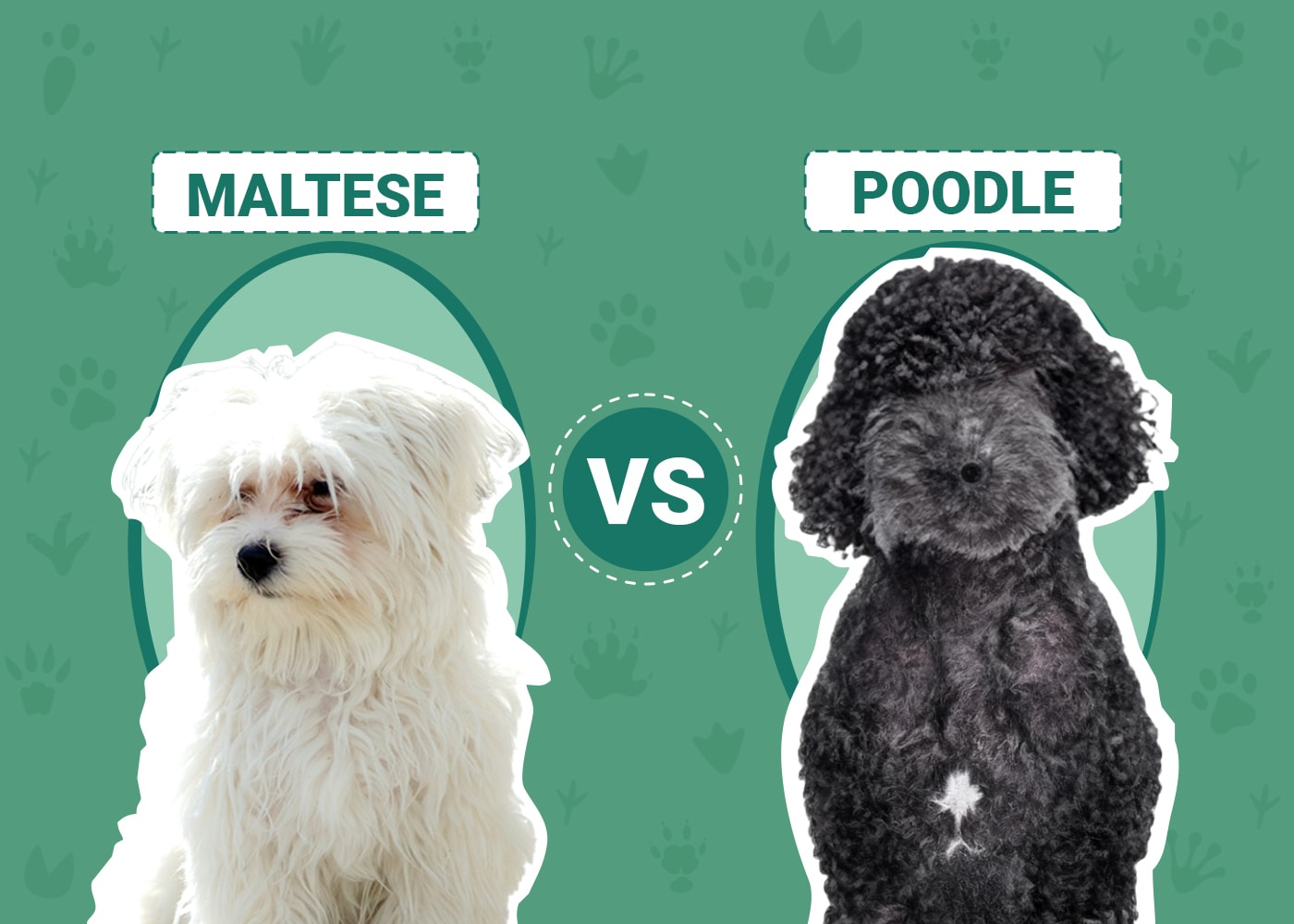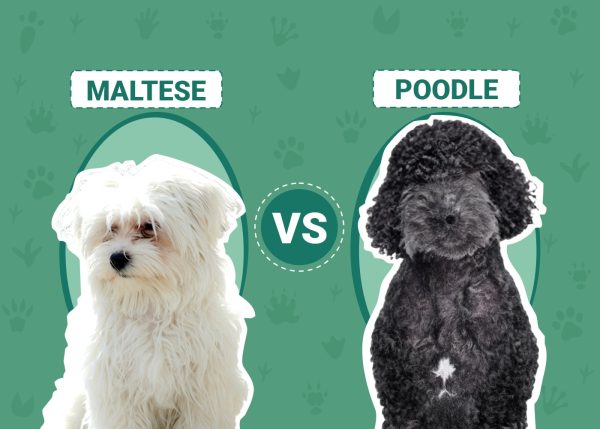Click to Skip Ahead
Are you considering a new pet and unsure which dog breed will fit best in your home and match your lifestyle? The Maltese and Poodle have some key differences, like their size and grooming needs, but also some similarities. It’s essential to research the breed of dog you choose, so you know what to expect from their personalities, training ability, and more. This will make for a smoother transition for both the pet and you.
Let’s compare the beautiful but petite Maltese and the larger but more playful standard-sized Poodle so you can make a more informed decision when adopting a puppy or adult dog. Keep reading to learn more!

Visual Differences
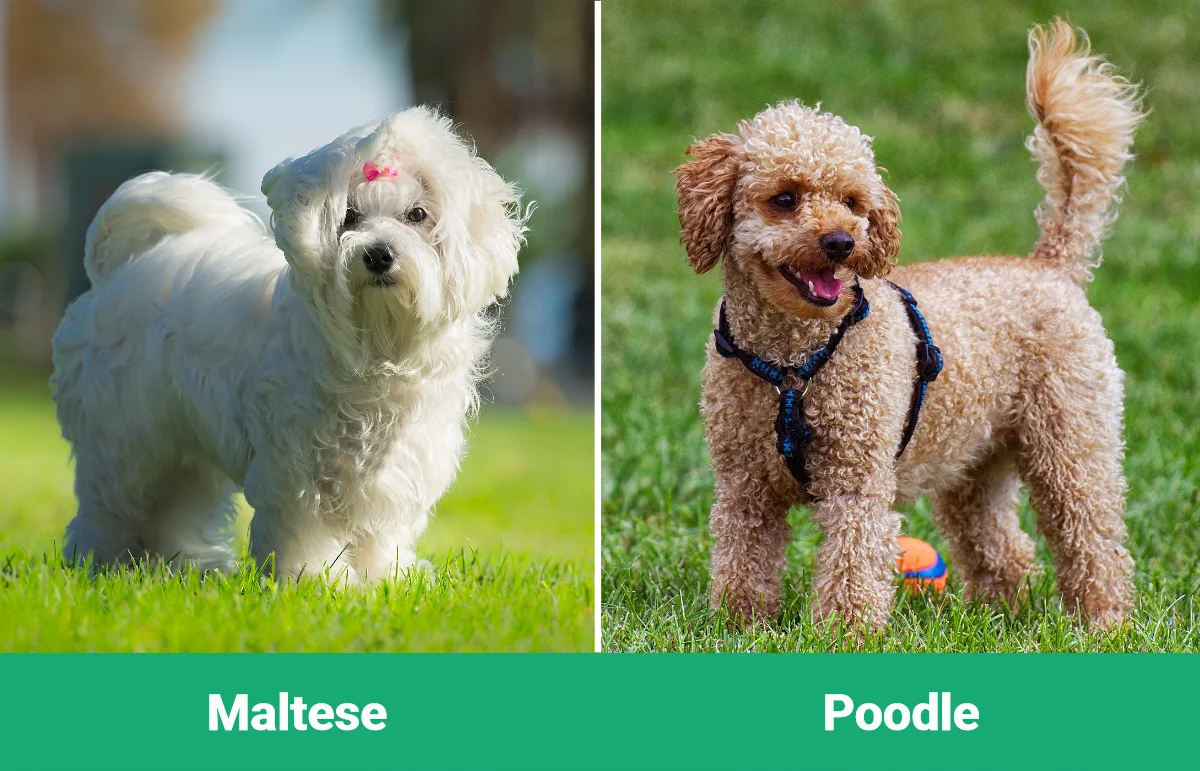
At a Glance
- Average height (adult): 7–9 inches
- Average weight (adult): under 7 pounds
- Lifespan: 12–15 years
- Exercise: 20–30 minutes
- Grooming needs: High, low shed
- Family-friendly: Yes
- Other pet-friendly: Yes, even cats
- Trainability: Easy to train with positive reinforcement
- Average height (adult): over 15 inches (standard)
- Average weight (adult): 40–70 pounds (standard)
- Lifespan: 10–18 years
- Exercise: 1+ hours
- Grooming needs: High, low shed
- Family-friendly: Yes
- Other pet-friendly: Yes
- Trainability: Eager to please, need early socialization

Maltese Overview
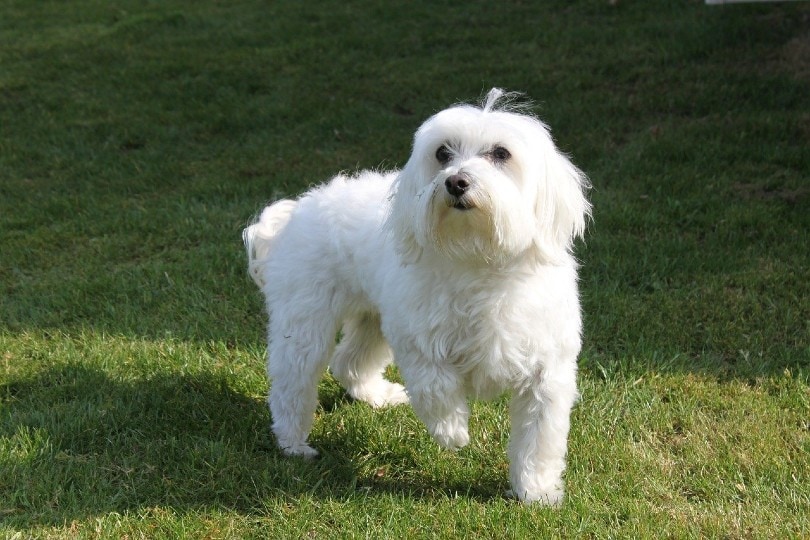
Personality / Character
The Maltese are a very social breed that loves to be around people. In fact, they may become anxious if left alone for long periods. They are one of the more popular lap dogs and often companions for older adults or those needing a therapy pet. Because they are of similar size as most house cats, the Maltese often get along very well with them, as long as the cat tolerates dogs.
Barking is one of their more obnoxious behaviors, which can be a problem for those living in an apartment. However, this can be addressed with regular socialization that helps to lessen anxiety.
Training
Positive reinforcement is the way to go when training a Maltese puppy. They are very eager to please, and a few training treats will go a long way to earning their trust and love. Going beyond the basic commands and on to agility or rally training is relatively easy.
You’ll often find this breed competing in shows and competitions due to their easygoing but easy-to-train nature. Scenting and tracking could be another way to keep your Maltese on their toes.
Exercise
Like any dog, the Maltese need daily exercise. However, they only require 20-30 minutes each day, and a walk around the neighborhood, a game of fetch in the backyard, and interactive toys are great ways to get the exercise they need.
If you choose the walk, you can even get the activity recommended for you by the CDC as well. The breed is known to get bored of similar exercise routines, so changing it up or focusing on agility training routines is ideal.
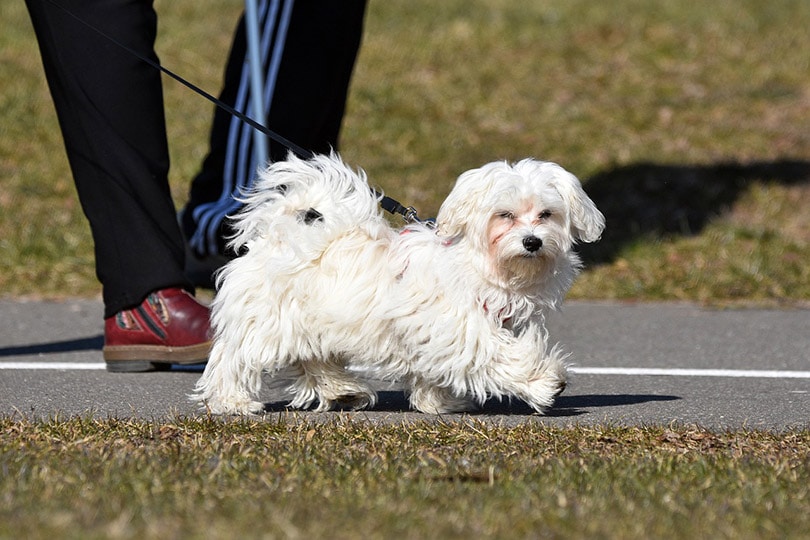
Suitable for:
The Maltese are ideal for quiet homes where there is usually someone at home most of the time. They are small and fragile, so they aren’t suitable for homes with young children, but they are perfect for adults who need a companion throughout the day. They could be a great choice if you cannot provide long periods of exercise but can still offer consistent training and regular socialization with other humans and pets. Those looking for a therapy or companion pet should consider the Maltese.
- Adapts well to apartment homes
- Very affectionate, an ideal lap dog
- Very smart and easy to train
- Doesn’t need as much exercise
- Friendly with other pets, including cats
- An excellent option for new pet parents
- Doesn’t like being alone
- Is fragile and cannot play or be handled roughly
- Needs extensive grooming
- Tendency to bark, especially when anxious

Poodle Overview
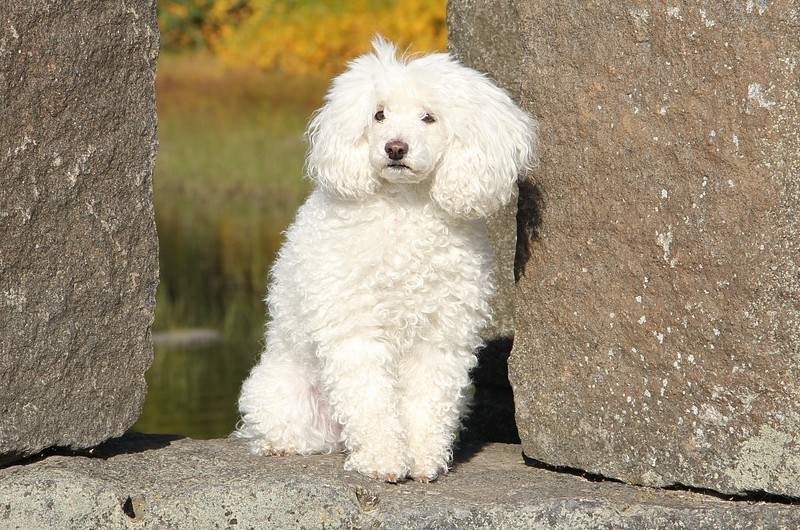
Personality / Character
As a top five most popular breed in 2021, as ranked by the AKC, the Poodle is friendly, energetic, and overall just a fun pup. Their natural disposition makes them ideal family pets. While they respond very well to training because they are eager to please, they look to the same people for cues on how to act.
Adult dogs can revert to destructive behavior if their surroundings are chaotic or if they are left alone for long periods. That same trait can be great, making them adaptable to many owners and homes. Are you active and love to go for morning walks? Do you have three young and energetic kids? A Poodle may fit any of these lifestyles and more.
Training
Poodles are known for their intelligence, having been originally bred as hunting dogs and now used often as scent trackers for rescues and other missions. As you can imagine, these tough jobs take quite a bit of training.
The breed is eager to please and responds well to positive reinforcement, both excellent traits. However, socialization with people and other pets very early on is essential. Poodles that miss out on this may lose their ability to adapt to changing environments as adults, so this should be a necessary part of a puppy’s training.
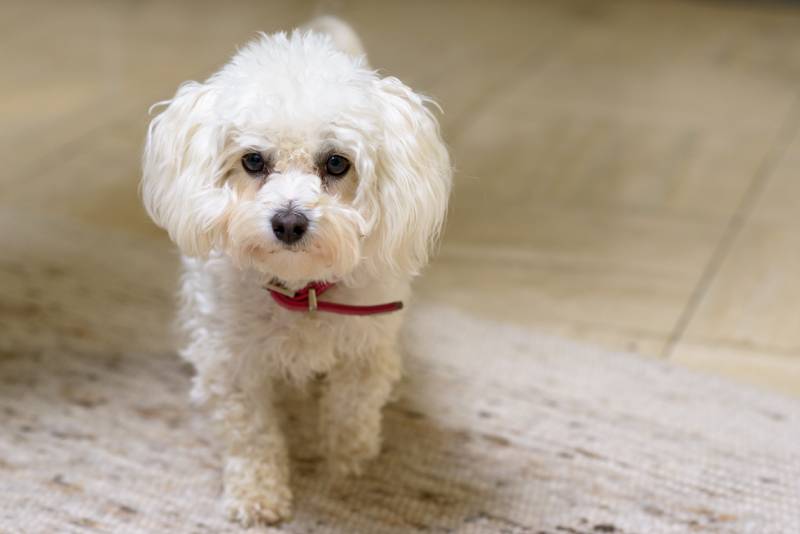
Exercise
Poodles only need about an hour of regular exercise each day. However, they are a very high-energy breed that will keep you on your toes throughout the day. If they’ve adapted to socialization as a puppy, a Poodle is an excellent choice for a family pet because they can often match the same energy as young children ready to run in the backyard or play at the park.
They also have a water-resistant coat and a natural affinity for swimming. While not essential, some fun at the pool or lake would be a great way to spoil your pup.
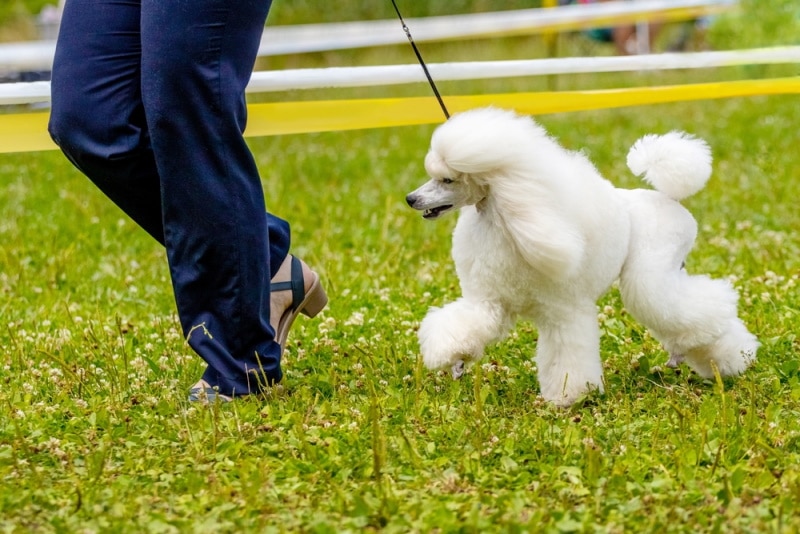
Suitable for:
The Poodle breed is versatile and can adapt to different home environments. That is why they are one of the most popular breeds in the US year after year. They can become anxious if left alone for long periods, leading to mischievous behavior, so having someone check on them during the day or enrolling your pup in doggy daycare may help.
Because socialization is critical starting early, Poodles are best in households where they regularly interact with other pets and humans.
- Low tendency to bark
- Very few genetic health conditions
- Easy to groom with little shedding
- Ideal pet for apartment living
- Playful with children and other pets
- Very intelligent and easy to train
- Doesn’t like being alone
- Not the best for home protection
- May develop an “attitude”
- Tendency to gain weight

Which Breed Is Right For You?
The Maltese and Poodle breeds are very different in many ways. The Maltese are small and fragile, but the Poodle is bigger and ready to play with kids. Their grooming needs are also different, with the Maltese requiring much more care than the Poodle, which is often recommended for those with pet allergies. The amount of daily exercise needed should also be considered when comparing the two. However, they are similar in that they are intelligent, easy to train, and love to be an essential family member, often sticking close to their loved ones.
When considering a new pet, take stock of your home environment, who lives there, and who comes and goes regularly. What are your work hours, or who will likely be home when you aren’t? Do you have a quiet home or lead a busy lifestyle? The best pet for you will become much more apparent once you’ve considered these, especially when comparing breeds like the Maltese and the Poodle.
Related Reads:
- Maltese vs. Shih Tzu: Which One Is Right for Me?
- Moyen vs Standard Poodle: The Differences (With Pictures)
Featured Image Credit: Top – Archibald Marajas, Pexels | Bottom – chili71, Pixabay

